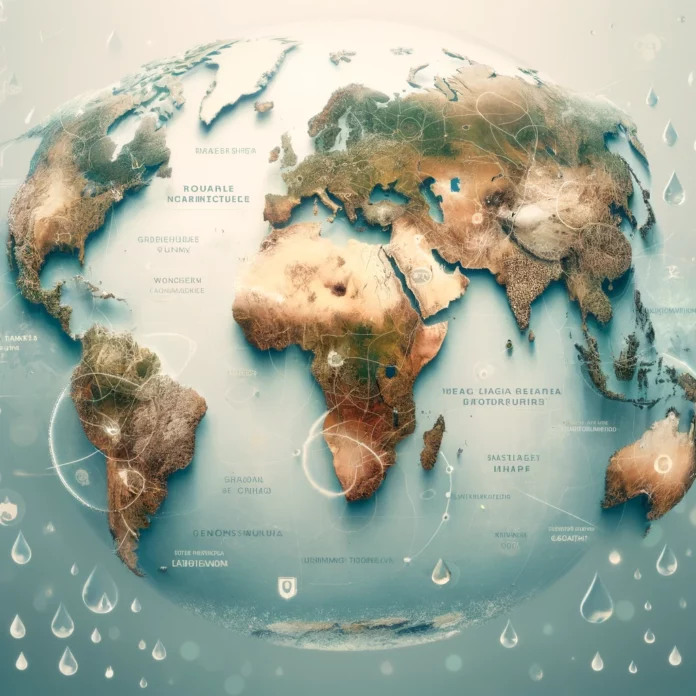A looming global water crisis threatens to significantly impact both the economy and food security. According to a recent report by the Global Commission on the Economics of Water (GCEW), global water scarcity could reduce economic growth by at least 8% and put half the world’s food supplies at risk by 2050. The commission, backed by the Organization for Economic Cooperation and Development (OECD), has called for a new international water pact to address this mounting crisis. This article will explore the findings of the GCEW report and the urgent need for global cooperation to ensure sustainable water management.
The Mounting Water Crisis
Climate change, destructive land-use practices, and poor water management have placed the global water cycle under unprecedented stress. The GCEW, a research initiative launched by the Netherlands in 2022, released its final report on the issue, emphasizing the need for global action.
Densely populated regions such as northwestern India, northeastern China, and parts of Europe are particularly vulnerable to severe water shortages. If left unaddressed, these shortages could lead to food production declines, loss of biodiversity, and social instability, severely disrupting global economic systems.
According to the report, shifting rainfall patterns have exacerbated the problem. Every 1°C rise in global temperatures increases atmospheric moisture retention by 7%, leading to unpredictable and extreme weather events. Johan Rockström, director of the Potsdam Institute for Climate Impact Research and a co-chair of the commission, warned that “for the first time, we are actually changing the very source of all freshwater – namely precipitation.”
The Critical Role of Green and Blue Water
The GCEW report highlights the importance of both “blue water” and “green water.” Blue water refers to freshwater found in rivers and lakes, while green water is moisture stored in soils and plants. This green water plays a crucial role in sustaining rainfall cycles, contributing to approximately 50% of global rainfall through “atmospheric rivers” — natural systems that carry water vapor through the atmosphere.
However, rising global temperatures are creating a vicious cycle of lower soil moisture, which intensifies droughts and wildfires, further disrupting atmospheric rivers. This feedback loop of degradation and biodiversity loss threatens ecosystems and agriculture.
Regions dependent on irrigation are especially at risk. The report estimates that on the current trajectory, global cereal production could fall by as much as 23%. Such a decline would have severe consequences for food security, particularly in water-stressed regions.
The Call for a Global Water Pact
The GCEW report stresses the need for an international water pact to mitigate these growing threats. Singapore President Tharman Shanmugaratnam, a co-chair of the commission, stated that the world must “set common goals for water sustainability.”
Establishing a global framework for water management will take years, but Shanmugaratnam is optimistic that nations can begin this critical process now. Governments, the report suggests, must work together to create incentives that transform how water is consumed and managed globally.
Financing mechanisms are urgently needed to ensure that water infrastructure is built and maintained, especially in vulnerable countries. Additionally, banks should make their lending conditional on responsible water use, tying investment decisions to sustainability.
Addressing Water Pricing and Agricultural Subsidies
A key recommendation from the GCEW is that global efforts should focus on pricing water correctly. Water is often underpriced or considered a free resource, leading to its overuse and mismanagement. By putting an appropriate value on water, consumption could be better regulated.
Another crucial reform involves the redeployment of an estimated $600 billion in annual agricultural subsidies. These subsidies often encourage the planting of water-intensive crops in unsuitable regions, further straining water resources. Ngozi Okonjo-Iweala, Director-General of the World Trade Organization and a GCEW co-chair, called for reallocating these funds to promote sustainable farming practices and reduce overconsumption.
Water Scarcity and Geopolitical Tensions
Water scarcity does not only affect agriculture and the environment—it also has the potential to aggravate geopolitical tensions. As water becomes more scarce, competition between regions and nations could increase, reducing the likelihood of transboundary cooperation.
Genevieve Donnellon-May, a researcher at the Oxford Global Society, warned that water scarcity could lead to “less transboundary cooperation, both at a subnational level and between nations.” This could result in increased conflict over shared water resources, such as rivers that flow across national borders.
To prevent such conflicts, Donnellon-May and others advocate for strong multilateral cooperation. Nations must work together to manage shared water resources and develop frameworks for equitable distribution, especially in regions prone to droughts and water shortages.
The Path Forward
The world is at a critical juncture when it comes to water management. Without immediate action, the global water crisis could derail efforts to combat climate change, reduce poverty, and ensure food security. The GCEW’s call for a global water pact offers a roadmap for the future, but cooperation at all levels—local, national, and international—will be essential.
Governments, businesses, and individuals alike must adopt water-saving practices, invest in sustainable infrastructure, and participate in global efforts to safeguard this precious resource. The future of food security, economic growth, and environmental sustainability all depend on how we manage water in the coming decades.
Conclusion
The findings of the GCEW report are clear: the global water crisis is not just a distant threat but an immediate challenge that demands urgent action. A new international water pact is necessary to secure a sustainable future. By addressing water mismanagement, transforming consumption patterns, and encouraging cooperation between nations, the world can mitigate the effects of climate change and protect the very foundation of life—our water resources.


